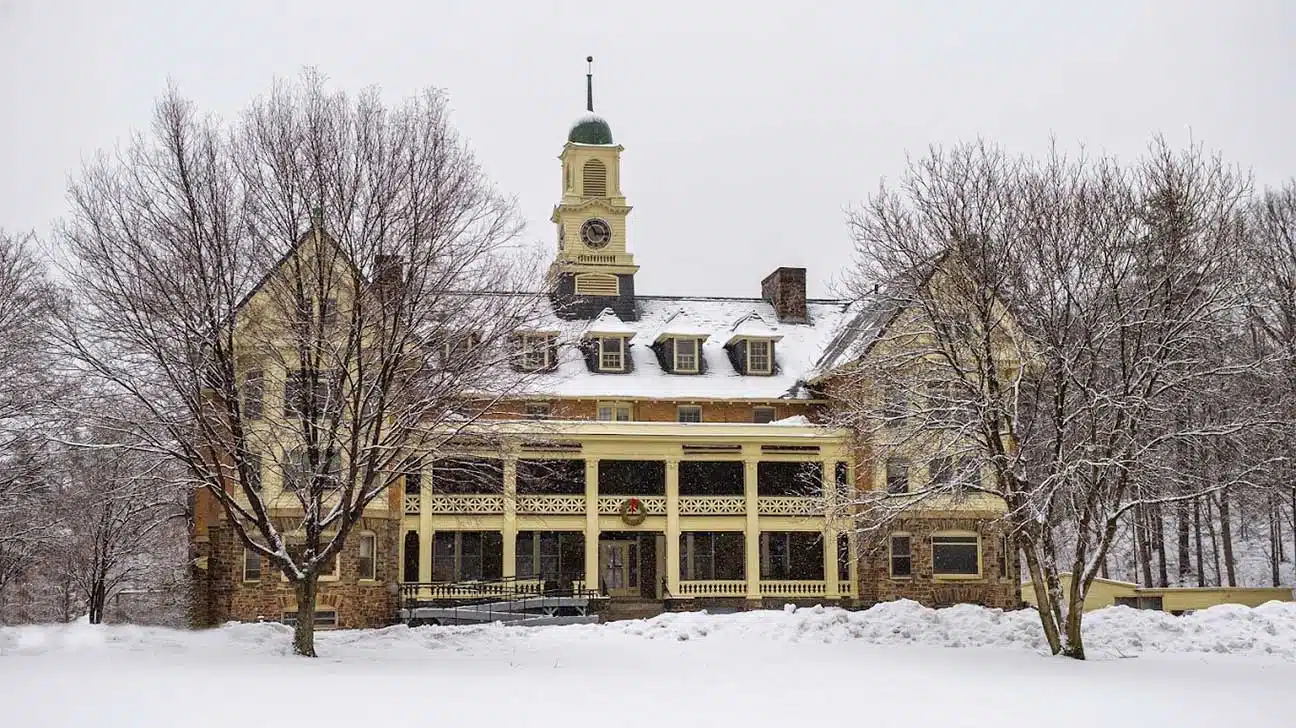
In Vermont, you can find co-occurring disorder services through a short-term inpatient program, residential treatment facility, or other types of treatment facilities.
There are a few dual diagnosis rehab facilities that offer treatment for substance abuse and mental health conditions.
We have included some of the best options for Vermont dual diagnosis rehab centers in the following list.
List Of Dual Diagnosis Treatment Centers In Vermont
Below is a list of drug rehab programs in Vermont that offer dual diagnosis services. Each treatment center on this list is licensed, accredited, positive reviews, or other quality marks.
1. Brattleboro Retreat, Brattleboro, Vermont
Substance use disorders are treated in Brattleboro, VT, with inpatient programs, outpatient treatment, medication-assisted treatment (MAT), and partial hospitalization programs (PHP).
Co-occurring mental health and drug addiction treatment is available with the adult inpatient drug rehab program.
Brattleboro Retreat features the following credentials:
- evidence-based treatment programs
- accreditation from the Joint Commission
- accreditation from the American Psychological Association
Location and contact information:
1 Anna Marsh Ln.
Brattleboro, VT 05301
(802) 258-3737
2. River Rock Treatment, Burlington, Vermont
This drug rehab center in Burlington, VT, offers several Joint Commission-accredited drug treatment and co-occurring mental illness services.
Treatment options at River Rock Treatment include:
- dialectical behavioral therapy (DBT)
- cognitive behavioral therapy (CBT)
- MAT
- alumni services
- individual and group therapy
- meditation and yoga
- 12-step immersion
- family services
- trauma therapy
- motivational interviewing (MI)
Location and contact information:
125 College St.
5th Fl.
Burlington, VT 05401
(888) 308-2624
3. University Of Vermont Medical Center DayOne, Burlington, Vermont
DayOne is an evidence-based substance abuse treatment program near South Burlington, VT, provided by the University of Vermont Medical Center.
The treatment program can help individuals with alcohol dependency, addiction to
cocaine, benzodiazepines, and opiates as well as co-occurring mental health issues.
The facility offers three levels of outpatient treatment, which include services such as:
- intensive outpatient program (IOP)
- women’s recovery group
- CBT skills group
- relapse prevention
Location and contact information:
1 S. Prospect St.
Lvl. 3
Burlington, VT 05401-5505
(802) 847-3333
4. Valley Vista, Vergennes, Vermont
This is a dual diagnosis addiction treatment center that offers gender-specific inpatient treatment for mental health and substance use disorders in Vergennes, VT.
Trusted features of Valley Vista include:
- Commission on Accreditation of Rehabilitation Facilities (CARF) accreditation
- recognition by the State of Vermont and the Dartmouth Psychiatric Research Center for a high level of performance related to Dual Diagnosis Capability in Addiction Treatment (DDCAT)
- membership in the National Association of Addiction Treatment Providers (NAATP)
Here, clients can get treatment services such as:
- group, individual, and family therapy
- medically supervised detoxification
- mental health services
- recovery-focused groups
- CBT
- relapse prevention skills
- holistic therapies such as music, art, and yoga
Location and contact information:
1 Alden Pl.
Vergennes, VT 05491
(802) 222-5201
Types Of Treatment For Co-Occurring Disorders At Rehab Centers In Vermont
Treatment for co-occurring disorders in Vermont usually centers on therapeutic approaches. These can range from evidence-based therapeutic modalities to experiential treatments.
A diverse range of therapies to address individual needs may include:
- art therapy
- MI
- CBT
- contingency management
- assertive community treatment
- DBT
- therapeutic communities
- equine therapy
- music therapy
You may also find medical and holistic approaches to addiction treatment including medication for mental health and substance abuse disorders.
On the holistic side, rehab centers may offer meditation, yoga, or wellness education.
How Common Is Dual Diagnosis In Vermont?
Between 13,500 and 25,400 adults in Vermont have co-occurring mental health disorders and substance use disorders.
About 27,000 adults in Vermont have a serious mental illness, about half of whom have a substance use disorder.
Another 77,000 adults have a moderate mental health disorder, about one-third of whom have a substance use disorder.
How To Choose A Dual Diagnosis Program In Vermont
It can be difficult to select the right substance abuse and mental health care provider.
As you search for a treatment center for yourself or a loved one, look for drug and alcohol abuse centers that feature the following.
Specialized Dual Diagnosis Treatment
The most important factor to look for in a rehab center is specialized treatment for dual diagnosis clients or those with co-occurring disorders.
Do not choose a program that merely offers counseling or mental health services, choose a program that provides co-occurring disorder programs.
Types Of Treatments Available
After you find a program that offers specialized co-occurring disorder treatment, you’ll want to choose a program that offers a range of evidence-based services.
Mental health and drug abuse services to look for include:
- behavioral therapy, such as MI, CBT, and DBT
- family therapy
- co-occurring disorder groups
- support groups
- individual psychotherapy
- aftercare services for continued recovery
- sober living options
Inpatient Or Outpatient Programs
Finally, you should decide between an inpatient rehab program or an outpatient level of care. In Vermont, both options are available at a few treatment centers.
With an inpatient or residential program, you’ll live on-site. These facilities often offer detox for drug and alcohol addiction, methadone maintenance for opioid abuse, and transitional living.
Outpatient programs may have day or evening treatment programs available and typically involve weekly therapy.
Vermont Dual Diagnosis Treatment FAQs
Browse the following frequently asked questions about dual diagnosis drug and alcohol rehab centers and rehabilitation services in Vermont.
How Do I Pay For Dual Diagnosis Treatment In Vermont?
You can use private health insurance, Medicaid, Medicare, self-pay, and other funding options. Many rehab centers accept private health insurance coverage for dual diagnosis treatment plans.
Not all treatment centers accept government-sponsored health insurance programs, but there are some that will take Medicare or Vermont Medicaid for addiction treatment.
What Are The Benefits Of A Vermont Dual Diagnosis Rehab Program?
At a dual diagnosis rehab program, you can treat the intersection between a mental health diagnosis and a substance use disorder diagnosis.
You will still receive the addiction treatment you need, such as alcohol and drug detox, MAT (if it fits into your treatment plan), or addiction therapy.
A dual diagnosis program will help you to learn more about how the disorders relate to one another and how to cope with the symptoms of those disorders.
What Is The Difference Between A Vermont Dual Diagnosis Rehab Center And A Vermont Addiction Rehab Center?
A standard Vermont addiction treatment center only focuses on addiction to substances — such as opioid pain relievers, meth, or cocaine — and usually provides general mental health services.
A dual diagnosis rehab center treats substance abuse and mental health together and can offer specialized treatment approaches based on an individual’s co-occurring disorder.
Find A Dual Diagnosis Rehab Center Today
If you or a loved one are battling a mental health and substance use disorder, you can find addiction treatment today. Call us to learn about starting the dual diagnosis recovery process.
Updated on April 10, 2023
Addiction Resource aims to provide only the most current, accurate information in regards to addiction and addiction treatment, which means we only reference the most credible sources available.
These include peer-reviewed journals, government entities and academic institutions, and leaders in addiction healthcare and advocacy. Learn more about how we safeguard our content by viewing our editorial policy.
- Substance Abuse and Mental Health Services Administration — Co-Occurring Disorders and Other Health Conditions
https://www.samhsa.gov/medication-assisted-treatment/medications-counseling-related-conditions/co-occurring-disorders - National Alliance on Mental Illness (NAMI)
https://www.nami.org/NAMI/media/NAMI-Media/StateFactSheets/VermontStateFactSheet.pdf - National Institute of Mental Health (NIMH)
https://www.nimh.nih.gov/health/topics/substance-use-and-mental-health - National Library of Medicine: MedlinePlus
https://medlineplus.gov/dualdiagnosis.html#:~:text=Someone%20with%20a%20dual%20diagnosis,you%20emotional%20and%20social%20support. - Substance Abuse and Mental Health Services Administration (SAMHSA)
https://www.samhsa.gov/medication-assisted-treatment/medications-counseling-related-conditions/co-occurring-disorders


